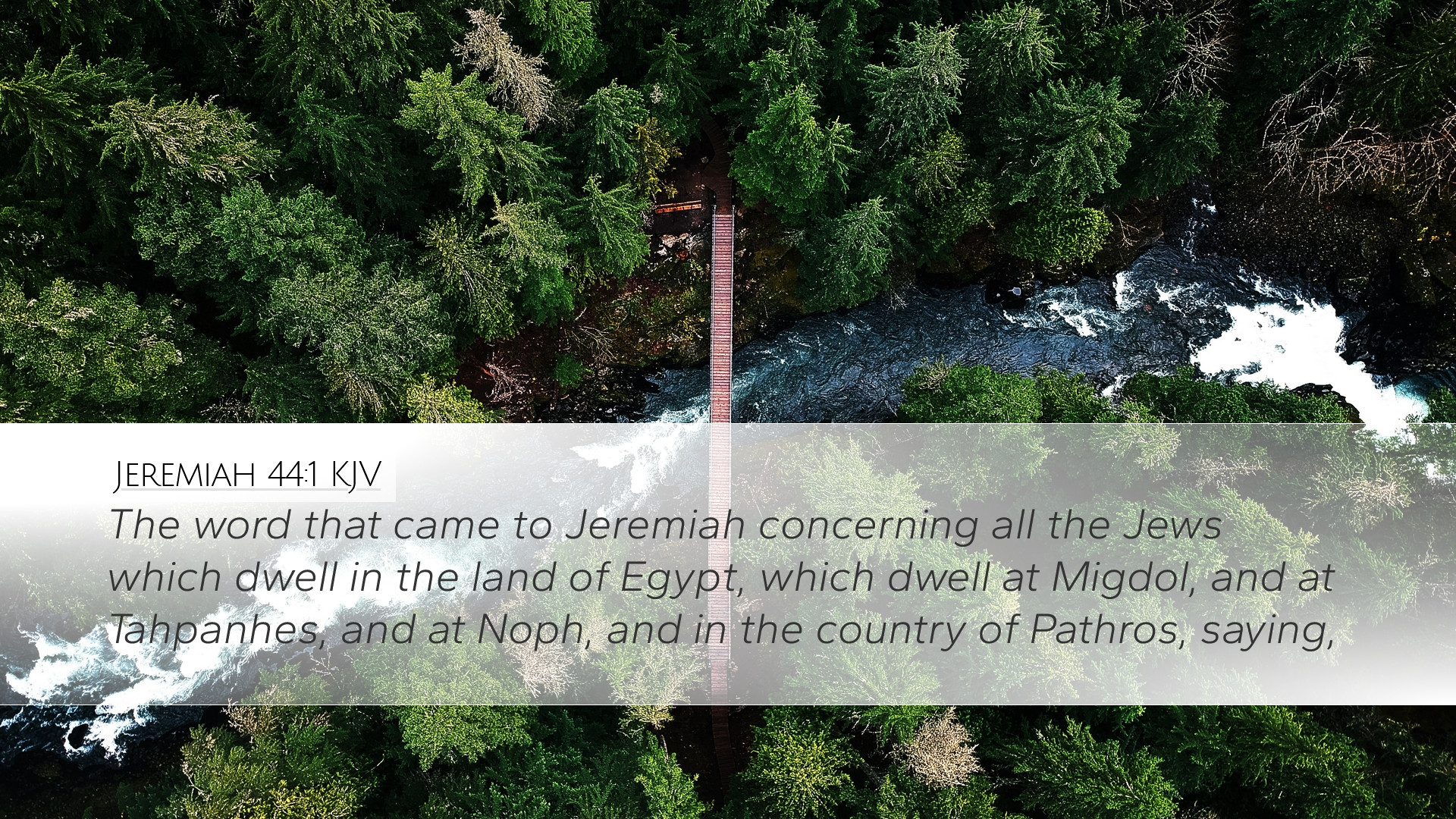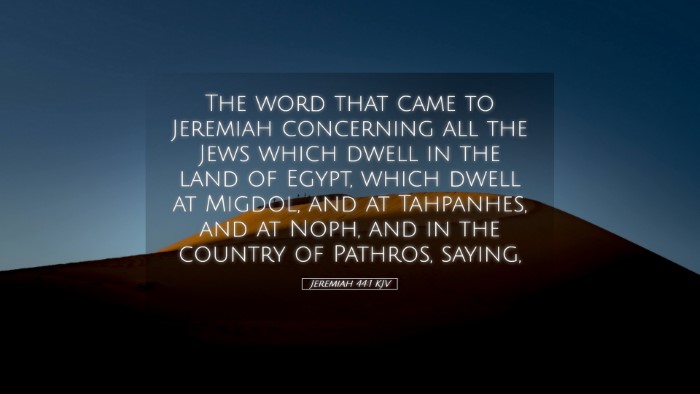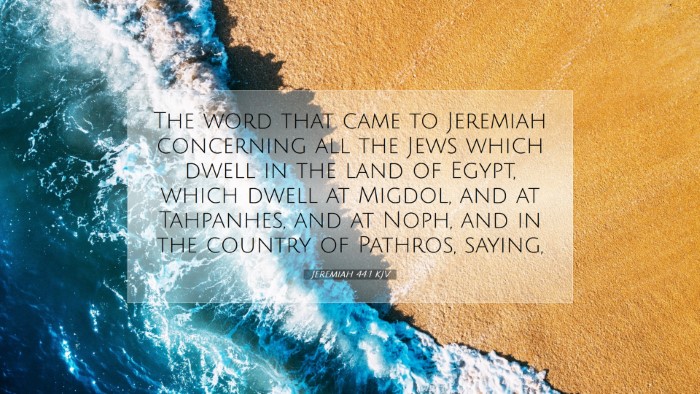Commentary on Jeremiah 44:1
Context of Jeremiah 44:
The Book of Jeremiah is a vital record of prophetic messages during a tumultuous period in Israel's history. As a prophet, Jeremiah addresses both the impending doom of Jerusalem and the hope for restoration. In chapter 44, Jeremiah shifts his focus to the exiled Israelites living in Egypt, revealing their persistent idolatry despite God's previous warnings.
Verse Analysis: Jeremiah 44:1
“The word that came to Jeremiah concerning all the Jews which dwell in the land of Egypt, which dwell at Migdol, and at Tahpanhes, and at Noph, and in the country of Pathros, saying,” (KJV)
This verse sets the scene for one of Jeremiah's poignant discourses directed towards the Jewish people who had fled to Egypt after the fall of Jerusalem. The mention of specific locations—Migdol, Tahpanhes, Noph, and Pathros—highlights both the geographical context and the widespread existence of the Jewish community in Egypt.
- Geographical Importance: Each mentioned location signifies a vital geographical and cultural context for understanding the exile. Migdol, for instance, was a border town; Tahpanhes is identified with the ancient city of Daphnae, Noph is another name for Memphis, and Pathros indicates Upper Egypt. Understanding these locations helps elucidate the socio-political climate in which these exiled Jews found themselves.
- Prophetic Authority: The phrase "the word that came to Jeremiah" emphasizes the divine origin of the message. It affirms Jeremiah's role as a prophet whose words are not mere human utterances but are inspired by God himself. This is crucial for recognizing the weight of the subsequent exhortations and admonitions that follow in the narrative.
- Audience Focus: Jeremiah's audience comprises the Jewish diaspora, who, despite witnessing the calamity in Jerusalem, continue in a path of rebellion against God's commandments. This highlights a recurring theme in Jeremiah's ministry: the necessity of repentance and the rejection of idolatry.
Theological Insights
Jeremiah 44:1 serves as a sobering reminder of God's relentless call to the people to return to Him. The theological implications of this text resonate deeply with the themes of covenant fidelity and the consequences of disobedience:
- Covenant Faithfulness: The perpetual covenant between God and Israel is a focal point in Jeremiah's preaching. Here, the call to account serves as a reminder that faithfulness to the covenant is paramount for experiencing God's blessings.
- The Nature of Idolatry: This passage invites scrutiny of the exiled community's decision to worship foreign gods. It connects with the broader narrative of Israel’s struggle with idolatry throughout their history, illustrating how the lure of surrounding cultures can lead to spiritual decay.
- God's Sovereignty: The context hints at God’s sovereign control, even in foreign lands. The message Jeremiah conveys transcends geographical boundaries, affirming that God's presence and authority exist irrespective of human rebellion.
Historical Context
To grasp the full dimension of this verse, one must consider the historical backdrop of the Babylonian exile. After the fall of Jerusalem in 586 BC, many Jews sought refuge in Egypt, aiming to escape further oppression. However, their actions reflect a deeper spiritual malaise—abandoning trust in God's promises for reliance on external powers:
- Exilic Community: The Jewish exiles in Egypt represent a community grappling with identity—straddling the line between their heritage and their current pagan surroundings. This situation calls into question the nature of their faith and reliance on God for their future.
- Influence of Egyptian Culture: The allure of Egyptian religious practices posed a significant threat to the spiritual identity of the Israelites. Their yearning for safety in Egypt inadvertently manifested in an embrace of its idolatrous practices.
- Prophetic Urgency: Jeremiah's prophetic ministry was marked by a persistent urgency to bring the people back to repentance. In Egypt, he addresses the core issues of faith, identity, and the consequences of their decisions.
Practical Applications
For pastors, students, theologians, and Bible scholars, the insights from Jeremiah 44:1 provide several practical applications for contemporary faith communities:
- Faithful Witness: This passage challenges believers to examine their own commitment to fidelity in the midst of cultural influences that may draw them away from God. How do we maintain a faithful witness in a world filled with competing ideologies?
- Crisis and Identity: The crisis of identity faced by the exiles resonates with modern struggles. Understanding how to navigate crises while staying true to one’s faith and heritage is vital for personal and communal growth.
- Call to Repentance: The ongoing call to repentance is ever pertinent. How do our personal and communal practices align with God’s expectations? This commentary invites reflection on the need for consistent self-examination and spiritual evaluation.
Conclusion
Jeremiah 44:1 serves as a critical reminder of God's persistent call to faithfulness amidst cultural pressures. The historical and theological insights derived from this verse encourage a reflective journey for the modern believer, urging a return to covenant commitment and vigilance against the seductive power of idolatry. In our current context, may we heed the message of Jeremiah and be steadfast in our devotion to God, anchored in truth and guided by His Word.


